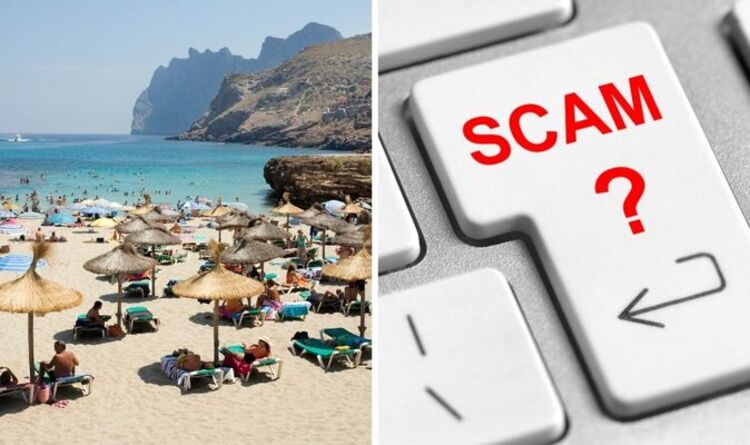Spain holiday warning as British tourists get scammed out of £100s – ‘cruel’
Travel expert reveals how to avoid holiday scams
We use your sign-up to provide content in ways you’ve consented to and to improve our understanding of you. This may include adverts from us and 3rd parties based on our understanding. You can unsubscribe at any time. More info
Under current Covid rules, fully vaccinated or boosted Britons do not need a Covid test before travelling to Spain. They need to be able to prove that they were fully vaccinated (with both doses of a two-dose vaccine or one dose of a one-dose vaccine) at least 14 days prior to arrival in Spain.
All tourists must complete a mandatory passenger locator form, the Forumulario de Control Sanitario (FCS), free of charge.
However, fraudsters have targeted vulnerable British tourists with scam websites asking fliers to pay €60 (£50) to fill out the form.
Unfortunately, this was not a one-time occurrence, as scammers are making the most of travel restrictions easing.
Seven members of a gang who sold fake Covid passports to unvaccinated tourists have been arrested.

Before their arrest, the gang managed to reel in an alarming 1,600 unvaccinated customers.
They were illegally enrolled on Spain’s National Vaccination Registry with help from health workers.
One of the gang members was arrested in the capital, Barcelona, while the remaining six were arrested in Madrid.
The charges they face include forgery and public health crime charges, including the potential theft of passwords to access the National Registry.
The scammers managed to attract the unvaccinated customers through adverts placed on anti-vaccination social media channels.
Payments were deliberately made difficult to track, made via cryptocurrency or transfers to overseas bank accounts.
Within just a few days, the unvaccinated subjects received a QR code allowing them to access a fake Covid passport.
The group reportedly charged €50 (approximately £41) for a negative PCR certificate, and a larger sum between €200-€1,000 (approximately £167-£839) for a complete Covid passport.

The worrying number of customers who paid for this service will also be investigated and may risk prosecution.
Fraudsters have developed new ways of scamming people due to the many travel restrictions imposed during the pandemic.
One of the “cruellest” scams has seen people innocent people tricked out of their money when being offered a fake refund for cancelled holiday.
Alarmingly, many travel scams look legitimate, with fraudsters “taking detailed steps to appear to be the business they are imitating, such as spoofing legitimate phone numbers and finding out booking details and exactly how much someone is owed,” according to Which?

Another scam has seen unlucky wannabe-holidaymakers paying for flights and holidays that simply do not exist.
Which? stated: “Rogue travel companies are selling fake flights and others are promoting some of the most popular stays with scam adverts on social media, offering apparent late or peak-season availability for holidays that appear to be sold out elsewhere.
“Some unfortunate customers do not realise they have been defrauded until they turn up at the airport or at their accommodation and find they are unable to check in.”
The NHS has not been safe from scammers, either; criminals have been sending out links to what looks like an official NHS platform in order to steal information.
Holidaymaking Britons must remain vigilant so as not to fall victim so such threats, always using gov.uk for official passenger locator forms, and verifying travel companies before giving out personal information.
Source: Read Full Article



